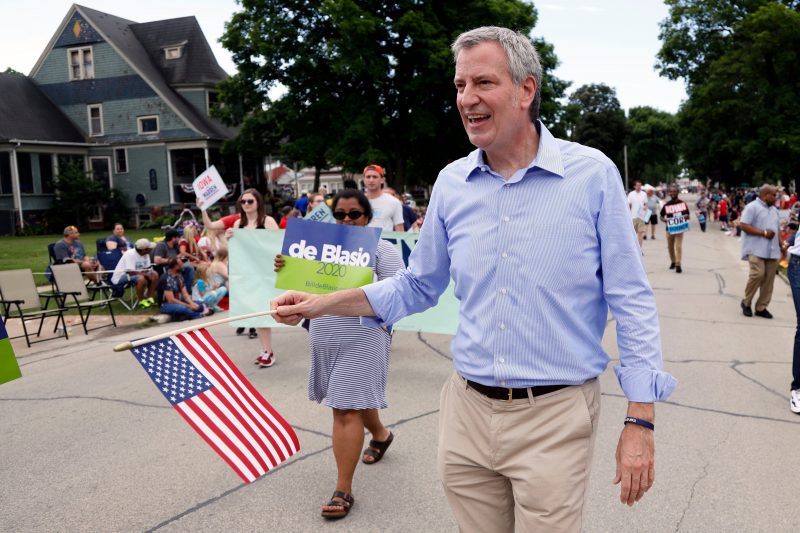Former New York City mayor Bill de Blasio (D) owes the city nearly $320,000 and must pay a $155,000 fine for using his government-issued security detail on travel “in connection with his presidential campaign,” according the city’s Conflicts of Interest Board.
In an order issued Thursday, the board said the then-mayor, between May and September 2019, had the city “pay the travel expenses for an NYPD security detail to accompany [him] or his spouse on 31 out-of-state trips in connection with his presidential campaign.”
Those 31 trips, the board said, resulted in $319,794.20 in expenses, excluding police officers’ salaries and overtime pay.
According to New York City’s conflict of interest law, public servants are prohibited from using city resources “for any non-City purpose.”
“When a public servant uses City resources for private purposes, it erodes the public’s trust and makes City government less efficient,” the board said in its Thursday order. “For this reason, the Board has routinely enforced this prohibition, particularly where a public servant uses City resources for the non-City purpose of advancing a campaign for elective office or other political activity.”
The board, in issuing its fine, concluded that de Blasio’s conduct “plainly violates this prohibition,” noting that there is “no City purpose” in paying for extra expenses connected to de Blasio’s travel on a presidential campaign. The board further stated that it advised de Blasio about this prohibition before the launch of his campaign. De Blasio, the board wrote, “disregarded” the advice.
The former mayor thus is being fined $5,000 for each of the 31 violations, resulting in the $155,000 fine, and is also being ordered to pay back the $319,794.20 the city spent initially.
De Blasio deferred comment to his attorney Andrew G. Celli Jr., who in a statement called the board’s ruling “reckless and arbitrary” and said the former mayor and his team have filed suit “to stop this inappropriate and perilous decision from ever taking effect.”
Celli argued that the ruling “threatens the safety and security of our democratically-elected public servants” during a “time of unprecedented threats of political violence.”
“Every Mayor faces threats, and all Mayors are entitled to protection — regardless of party or politics,” Celli said. “That’s why the NYPD is charged with determining what level of protection is necessary for such officials, when, and how.”
The board’s order comes after the New York City Department of Investigation concluded in October 2021 that de Blasio had cost the city that amount for ferrying his security team around during his failed presidential campaign.
In a scathing 49-page report, the Department of Investigation detailed that members of de Blasio’s security detail accompanied him on trips outside the city — including to a Red Sox game in Los Angeles — and occasionally gave rides to campaign staffers, which led investigators to conclude that “NYPD resources were used for political purposes.”
Investigators at the time faulted the mayor for not reimbursing the money to the city. De Blasio blasted that report, claiming it was “full of inaccuracies,” and he said such uses of his security detail followed the guidance of New York Police Department security experts and were based on the increased number of threats public officials face.
While de Blasio’s 2020 presidential campaign lasted four months, the Department of Investigation’s probe into allegations that the mayor had used his security detail for personal or political purposes lasted nearly two years. Detectives were reportedly tasked with helping his daughter, Chiara de Blasio, move her belongings from her apartment, and with driving his son to Yale University in Connecticut and locations in New York City.
Then-Department of Investigation Commissioner Margaret Garnett criticized de Blasio for using the security detail for tasks like chauffeuring his son, Dante de Blasio, in the city for personal needs and errands.
“It’s not security,” Garnett said at a news conference after the release of the report. “It’s essentially a concierge service.”
Paulina Villegas contributed to this report.








